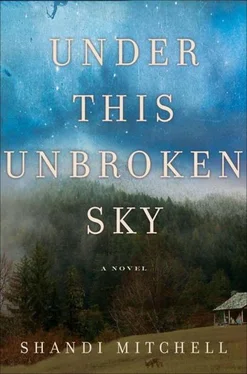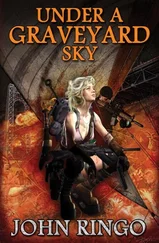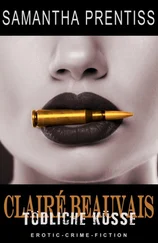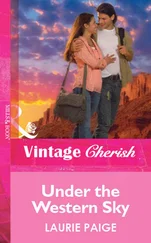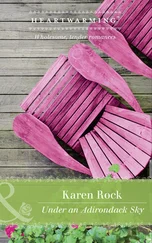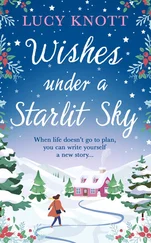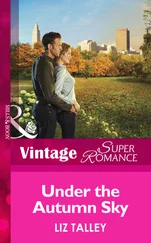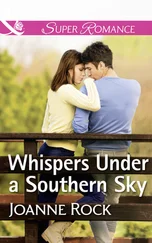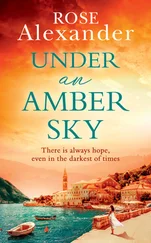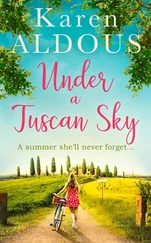Myron doesn’t have a secret stash. His possessions are out in the open. His father’s tools. Sharpened and oiled. The handles worn smooth. Each one marked with the initials T. M.
Between the folds of her linen, Maria has layered in seed packets, the picture of the Blessed Virgin, two wedding bands, a lock of Teodor’s salt-and-pepper hair, and her carved cross. Her mother’s Bible is there too. The pages loose in their binding. The cover page is scrawled with names and dates reaching back a hundred years. The most recent additions are written in Maria’s careful, ornate hand.
Maria Choma b. 1907 wife of Teodor Mykolayenko b. 1905.
Children:
Dania b. June 17, 1924
Myron b. August 31, 1925
Sofia b. May 4, 1927
Katya b. November 26, 1931
Ivan b. January 19, 1933
Maxim b. March 14, 1939
The last entry, written in loose, careless script with a wide pencil stub reads:
Teodor Mykolayenko, died December 17, 1938, of the flu
Of the flu is heavier. The letters have been traced several times to make it true.
Marking the page is a black-and-white photograph taken six years ago by a traveling photographer. They are standing in front of a granary on their first farm. They couldn’t afford the ten-cent fee, but Teodor traded three carved birds and two smokes.
They dressed in their best Canadian clothes and pretended there wasn’t snow on the ground. It was the first time Myron wore a tie. He didn’t tell his father that the knot was too tight. Ivan, still a baby, wouldn’t stop squirming. Sofia cried, because her dress didn’t fit and her hair had been cut short a few months earlier to get rid of the lice.
When Teodor crossed his legs to pose, that’s when Maria learned that he had also traded his socks. The spring chill leached through their summer clothes as they sat unmoving. They looked into the black eye of the camera and held their breath until the photographer said, “Breathe.”
It is their only photograph. Maria has studied the image a thousand times, searching his eyes. But there is no hint. No tell of what will come. In the moment between “Breathe” and the children swarming the camera, Teodor turned to her. He was smiling. His eyes glistened. And she saw such pride.
Myron hoists Katya onto the cart. Sofia clambers over the wheels and perches herself on one of the lashed-down chairs. Dania, cradling Maxim, tucks in between the stovepipe and a blanket box. A month old, the baby is fast asleep, oblivious to the life he is leaving. A brown birthmark, like a pawprint, marks the top of his right hand. Ivan hops onto the backboard of the cart. He holds on to the twine lashing down their hill of belongings. His legs, too long for his trousers, dangle over the edge, exposing bare shins.
The children look to their mother.
Maria stands in the doorway of the empty house. She memorizes its smell, its shape, the way it looked when it was full of life. She notices how well-built the frame is, how strong the timbers. She sees the clean, sharp lines etched by the hand planer, the sure, deep cuts of the saw and ax. This house would have stood a lifetime.
But this is not the time for good-byes. Those have happened already. They happened when they took her and the children into the woods to identify the body. His face had been covered with a piece of burlap. The heels of his socks needed darning. The .22 still in his hands. Perched in the fork of two twisted trees, his coat neatly folded, boots resting on top.
She said good-bye when they carried her husband’s frozen body into the house. He was curled up as though he were bowing. They laid him on the table. She washed him, put on a clean shirt. Waited for him to thaw to straighten his legs. He never fully uncurled. They buried him on his side in a wooden crate.
She said good-bye when the police, field agents, medical examiner, witnesses, and newspapermen streamed in and out of their house and Anna’s for three consecutive days, as if they were no longer there.
She said good-bye as she watched from a distance as they buried Anna on newly consecrated land, on the edge of the north quarter. Half the town came to pay their respects to a woman they never met. They erected a solitary wooden cross, a name, dates, nothing more, paid for by Josyp Petrenko. They wrote her name in English. They spelled it wrong.
She said good-bye to Lesya and Petro as best she could. She went to the neighbors and pleaded through closed doors. She made the trek to town, ignored the stares and slurs. She got down on her knees, kissed the hem of the priest’s robe. Told him that Lesya was a hard worker, a good girl who could clean and cook, and was blessed with a voice from heaven. She said Petro was strong and could keep the church stove burning. She pleaded with him not to let Children’s Services take them, that they needed God’s protection. But it was Anna’s silver hairbrush and mirror that swayed the priest to take the girl. Not the boy.
It was Josyp Petrenko who offered to take Petro in as a farmhand. He also took the cow, Lesya’s hens, and the store of seed grain. She watched from the other side of the stone wall as the children were taken away. Neither had proper winter coats.
She even said good-bye to Stefan, though nobody knew where he was.
She said good-bye again when they refused to grant her the land in her husband’s name and told her she would have to leave in the spring.
She said good-bye yesterday as she cleared away the thistle choking Teodor’s unmarked grave, just outside of the cemetery’s holy land, condemned even in death. Brother and sister still separated by a fence.
She has said a lifetime of good-byes.
Maria props open the door with a large rock to let the souls wander in and out. I give it back .
She looks to her children, who are watching her, waiting for a sign that everything will be all right. Her low heels sink into the mud. She looks down over the field, past the matted thatches of winter grass and wildflower sprays of purple, white, and blue to the black tilled soil. Its furrows already softened and collapsing. Prairie fireweed beginning to heal its scorched wounds. Soon the wild grasses will reclaim the soil and all that will remain will be the stone wall. A pile of rocks that kept nothing in and nothing out. She looks no further.
She kneels down beside the stoop and for a moment the children think she is going to pray. Instead, she takes hold of a large rock nestled against the riser and struggles to push it aside. Myron steps forward, uncertain whether he should offer to help.
The hem of his mother’s long skirt wicks the dew from the grass. He can see wisps of gray, like fine threads woven through her dark hair, escaping the tight binding of her red khustyna. Her waist is larger, her arms fleshier. Her hands dry and chapped. Large, strong hands. The nails, short and chipped, permanently stained with earth. A pale indent brands her ring finger. The rock rolls away.
Maria looks to her children, watching impassively, no longer surprised by secrets. She scans the empty horizon, then pries away the barn board propped against the side of the stoop. She looks up at Myron. He crouches down and peers under the step. He looks to his mother. Her eyes betray nothing.
He drags out a bundle swathed in his mother’s soiled blanket. Maria unwraps the faded woolen cloth, exposing a bulging burlap sack. She checks for mouse holes. No rot, no dampness. She unties the twine binding and opens the bag. The smell is dry and sweet. The seeds of grain are golden. For the first time since that night, she feels as though she might cry.
She stands brusquely. “Put it up front with the .22.”
Maybe someday his mother will tell him how she covered her tracks following the tangle of men’s boot prints into the moonless night and how still the horse stood at the stone wall as she went ahead. Maybe someday she’ll tell him how slowly she unlatched the granary door. Or how quietly the bag slid across the snow as she dragged it, harnessed behind her. A low, soft scrape. Maybe someday he will be brave enough to ask if she was afraid. Maybe someday he will tell her that he followed her there and then they will talk like only a mother and son can.
Читать дальше
